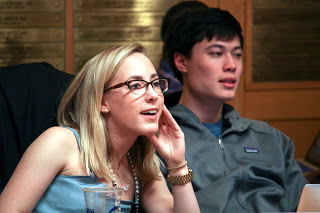- Public Policy
- Leadership
- Funding
- News & Events
- About the Center
Back to Top Nav
Back to Top Nav
Back to Top Nav
Back to Top Nav

Harry Sheehy, Chair and Director of Athletics at Dartmouth College, spoke to the Fellows about ‘Contemporary Leadership Competencies’. According to Sheehy, every leader will encounter six types of people in his or her lifetime. These people include the ‘resistant’, ‘reluctant’, ‘existent’, ‘compliant’, ‘committed’ and ‘compelled’ team members. These six types of team members can further be characterized into ‘energy-givers’ and ‘energy-takers’ – a leader should try to maximize the ‘energy-givers’ in her team. In this regard, Sheehy emphasized that “as a leader, you will get exactly what you tolerate”. So, it is important not to make general criticism but give constructive feedback to individuals who require it. In addition to this, it is important to be authentic and genuine, and to lead by example.
In order to begin a discussion on whether the end justifies the means, Sheehy gave the example of Bobby Knight, a controversial NCAA basketball coach. To highlight the qualities of humility and the importance of enabling teammates, Sheehy provided the example of Jeremy Lin, an American professional basketball player.
Sheehy emphasized the importance of accountability, as leadership is not a popularity contest. Therefore, a leader must learn to conflict productively. Harmony does not always lead to productivity, and leaders must learn to value productive conflict.
Sheehy concluded his talk by highlighting the five leadership mistakes of the 21st century (or any other century). These include 1) neglecting colleagues 2) assuming everyone is like you 3) not giving feedback 4) lack of focus 5) fear of change.
Sheehy advised the Fellows to be extremely intentional in their pursuit of leadership. The challenge is to lead intentionally instead of taking on leadership roles by ‘accident’ or because of peer pressure.
- Written by Maha Malik ’13
Photo taken by Curie Kim '13